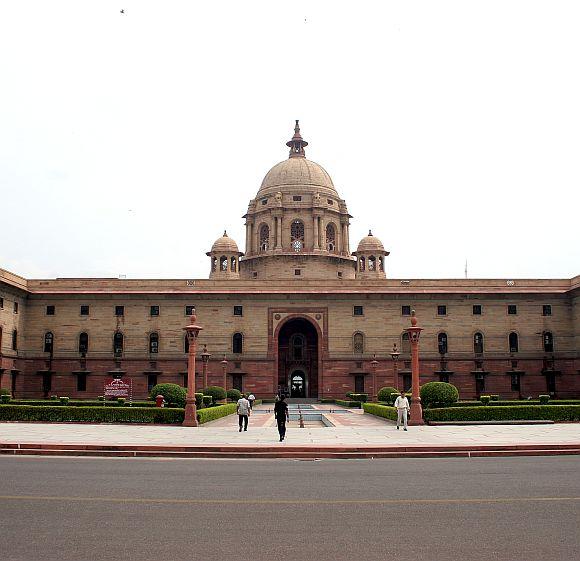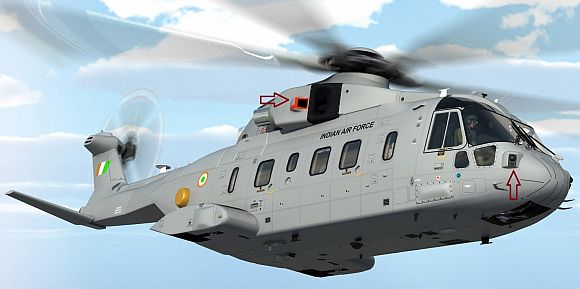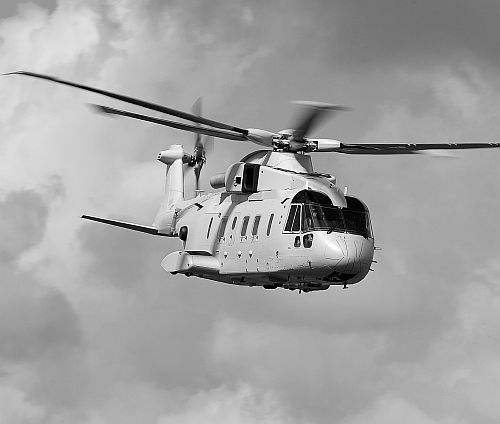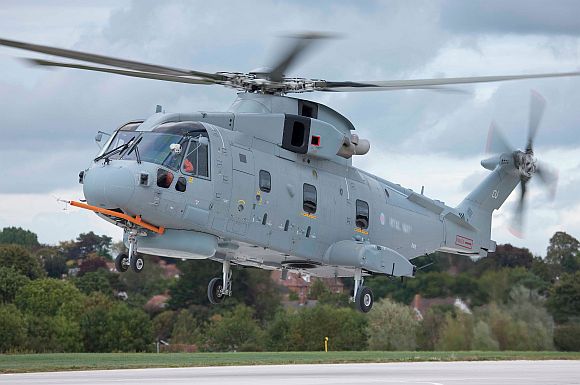 | « Back to article | Print this article |
VVIP helicopter deal: The government's take
In an unprecedented move, defence ministry issues detailed chronology of action on both the background to the decision to buy and what action it took since the first reports of alleged corruption appeared in the media. Ajay Shukla reports
With the opposition threatening to disrupt the Budget session of Parliament over allegations that kickbacks were paid in India in the 2010 purchase of 12 VVIP helicopters from Anglo-Italian company, AgustaWestland -- and the Bharatiya Janata Party stating that this had the "makings of a second Bofors scam" -- the ministry of defence has issued a detailed brief that makes public the facts in the case.
Such a detailed brief is unprecedented from the MoD, usually the most opaque of ministries.
According to the release, the predecessor NDA government changed the specifications of the helicopter in 2003. When reports of irregularities began appearing, the MoD urged the external affairs ministry to take action, but the MEA said it was constrained by Italian legal processes.
According to the MoD, the process of procuring a new fleet of helicopters for VVIP travel began in August 1999, when the IAF pointed out that the old Russian Mi-8 helicopters in its Communications Squadron (which pilots VVIPs) could no longer operate at night and in bad weather, and to helipads above 2,000 meters (6,500 feet).
The MoD floated a global tender in March 2002 for eight helicopters, mandating that they should be able to operate up to 6,000 metres (19,685 feet). While four vendors applied, just one -- Eurocopter's EC-225 helicopter -- met all the conditions.
Click on NEXT to read further...
VVIP helicopter deal: The government's take
At that stage, Prime Minister Atal Bihari Vajpayee's office decided to loosen the specifications, a decision that led to Agusta Westland winning the contract seven years later.
According to the MoD, "On November 19, 2003 a meeting was taken by then principal secretary to PM [i.e. Brajesh Mishra] on this subject. In the meeting, principal secretary observed that his main concern was that the framing of the mandatory requirements has led us effectively into a single vendor situation.
It was also noted that the PM and President have rarely made visits to places involving flying at an altitude beyond 4,500 metres. In the meeting it was decided to make the mandatory requirement for operational altitude 4,500 metres. The higher flying ceiling of 6,000 metres, and a cabinet height of 1.8 metres could be made desirable operational requirements.
It was observed that with these revisions, several helicopters which otherwise met all requirements but had been rejected due to the altitude restriction, would now come into the reckoning (emphasis in original)."
The MoD says that Brajesh Mishra followed up this meeting with a letter to the IAF chief on Dec 22, 2003 "stating that it was unfortunate that neither PMO nor SPG was consulted while framing these mandatory requirements. He suggested that CAS and defence secretary may jointly review the matter to draw up realistic mandatory requirements satisfying operational, security and convenience requirements of VVIPs and also set in motion a fast track process for selection and acquisition of the replacement helicopters."
Click on NEXT to read further...
VVIP helicopter deal: The government's take
Accordingly, the IAF, NSA, SPG/PMO and MoD consultatively framed out fresh operational requirements (ORs) from March 2005 to September 2006. They also decided to add 4 helicopters in the "non-VIP configuration" to the 8 helicopters in VIP configuration "for security reasons".
Business Standard understands that the Special Protection Group argued for four more helicopters for carrying additional security personnel and equipment.
By then, the Defence Procurement Procedure of 2005 (DPP-2005) had come into effect. Under its provisions, the Defence Acquisition Council sanctioned the procurement of 12 helicopters on January 3, 2006, under the "Buy" category.
A global tender was floated on September 27, 2006, which mandated that the supplier would have to fulfil 30 per cent offsets.
The MoD says "Three vendors, namely M/s Sikorsky, USA (S-92 helicopter), M/s Agusta Westland, UK (EH-101 helicopter) and M/s. Rosoboronexport, Russia (Mi-172 helicopter) responded to the RFP."
Since Rosoboronexport did not deposit earnest money, or a signed Integrity Pact, "their Techno-Commercial offer was not accepted," says the MoD.
Only the Sikorsky S-92 and the EH-101 were called for field evaluation trials.
Click on NEXT to read further...
VVIP helicopter deal: The government's take
Interestingly, the field evaluation trials were not carried out in India.
According to the MoD, "The Field Evaluation Trial of M/s Agusta Westland was carried out in UK and trials of M/s Sikorsky were carried out in USA from 16 January 2008 to February 2008.
The Field Evaluation Trial team submitted its report in April 2008 and recommended AW-101 helicopter of M/s Agusta Westland for induction into Service. SPG was also part of the Field Evaluation Trial team."
[The Agusta Westland helicopter was called the EH-101 till 2006-07, but was known as the AW-101 thereafter].
According to the MoD, the S-92 helicopter failed on four counts: It did not have a suitable "Missile Approach Warning System", which would warn the helicopter pilots about any missile fired at them; it could operate only up to 4,500 metres; it had problems with its "Drift Down Altitude"; and it could not hover high above the ground.
The MoD says, "Staff Evaluation Report assessed the VVIP helicopter AW-101 to be fully compliant with all SQRs."
Click on NEXT to read further...
VVIP helicopter deal: The government's take
From September 19, 2008 to January 21 2009, the Contract Negotiation Committee negotiated the terms of the contract with Agusta Westland. During this period, Air HQ, recommended inclusion of Traffic Collusion Avoidance System (TCAS-II) and Enhanced Ground Proximity Warning System (EGPWS) for all 12 helicopters and SPG/PMO recommended inclusion of Medevac System for 8 VVIP helicopters.
According to the MoD release, "The CNC, thereafter, recommended conclusion of the contract at a negotiated price of 556.26 million Euro." This is just under Rs 4,000 crore at today's exchange rate.
The Cabinet Committee on Security, the final approving authority for such contracts, approved the purchase on January 18, 2010. The contract for the supply of 12 AW-101 VVIP helicopters was inked with Agusta Westland, UK on February 8, 2010.
The MoD notes that the contract with M/s Agusta Westland includes specific contractual provisions against bribery and the use of undue influence, and spells out the articles that can be invoked in case wrongdoing is detected.
In addition, the MoD notes that Agusta Westland has signed an Integrity Pact that is effective for five years from the date of signing, or till the contract is executed, whichever is later. The penalties include "forfeiture of the earnest money, performance bond, cancellation of the contract without giving any compensation, to recover all the sums already paid with interest, to cancel any other contracts with the bidder and to debar the bidder from entering into any bid from the Government for a minimum period of five years which may be extended, etc."
Click on NEXT to read further...
VVIP helicopter deal: The government's take
The MoD release also details the action it has taken since the first reports of alleged corruption appeared in the media in February 2012.
The day after, "MoD sought a factual report in the matter from our Embassy in Rome."
The MoD wrote again to the embassy in April 2012, which sent a "detailed report on the status of the case" the next month, making it clear "that there are inherent difficulties in obtaining formal details of the case given the independence of the judiciary from the executive in Italy."
Eventually, "A formal request was indeed made by the embassy to the Naples prosecutors office on July 16, 2012 (emphasis in original)."
The release notes "MoD received more than one communication from M/s Agusta Westland confirming the statements in the press are "completely unfounded and have been issued with malicious intent" and that "no commissions whatsoever were paid" in the case."
The MoD says it was also impressing upon the MEA the need to press the Italian authorities on the issue. According to the release, "The defence secretary wrote to secretary (west), MEA, in October 2012, reiterating the importance of the need to get information from the Italian authorities, so that MoD could take further necessary action in this regard."
The MEA responded the "matter had been taken up with the Italian side and the position conveyed for the need for 'reliable information', for "news reports alone could not be the basis for the ministry of defence to make any preliminary determination".
Click on NEXT to read further...
VVIP helicopter deal: The government's take
In October 2012, the defence secretary also wrote to Secretary (West) to take up the matter with the government of UK in view of the alleged involvement of a British citizen and the fact that the contract was signed with M/s Agusta Westland, UK.
The next month, "secretary (west), MEA, replied to defence secretary stating that 'the UK authorities were waiting for the results of the Italian investigation in order to ascertain whether there are further actions to take'."
The MoD notes that it was willing to take action even on the basis of press reports.
However, "As soon as information was available of one concrete step having been taken by the concerned foreign investigative authorities, namely, the arrest of Giuseppe Orsi, CEO, Finmeccanica on February 12, 2013, the MoD handed over the case to CBI for investigation and put on hold all further payments to Agusta Westland."
"Besides this, the Indian Embassy has been requested to provide the factual position and any other relevant information. The CEO of M/s Agusta Westland has also been asked to categorically state the clear position in view of the current developments indicating specifically if any financial transaction has taken place with any Indian individual/entity which would be violative of the Integrity Pact or any other terms and conditions of the contract (emphasis in original)."







